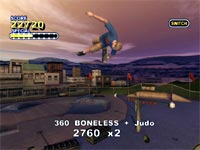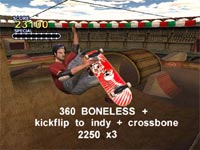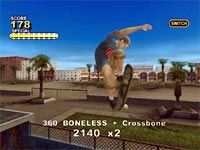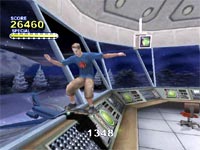




 | 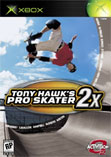 |
| |||||
|
|
Ever since the first game was featured as part of a Pizza Hut / PlayStation demo disc in early 1999, I've been completely and utterly in love with the Tony Hawk's Pro Skater series. It's always been a perfect formula, a flawless mixture of physical sport and mental planning. It's one of those few genres that manages to ascend from a lighthearted distraction to a legitimate, undeniable skill. You'll never see the same two-minute run twice in a game of Tony Hawk; there are just so many possibilities, so many tiny nuances to alter and / or improve upon. It's a classic formula, and when they tampered with it in THPS4 last year, I was vocally displeased. So it was with great hope and fond memories that I picked up a copy of Tony's Xbox debut earlier this month. Though I was aware that the game was primarily a repackaging, polishing and redistributing of the second game in the series, I couldn't have asked for a better game to grant that special treatment. There's no question in my mind, Tony Hawk 2 was the very pinnacle of Neversoft's success. It took the sound principals established by the first game, added a couple new (and completely necessary) tricks and maneuvers, and ramped the difficulty, number of goals, unlockables and secret areas beyond anyone's wildest imagination. It was a perfect progression from a nearly flawless debut, and established the series as a legitimate heavyweight. While THPS3 did a fine job of carrying the series into the next generation of consoles, there just wasn't as much room for improvement after the blockbuster that was chapter two. Right out of the gates, the first thing that strikes you in 2x is the tremendous leap forward the graphics have taken since the last time you saw the game in motion. As a diehard Dreamcast enthusiast who played through the original Tony Hawk 2 on that platform instead of the standard PSone, I wasn't expecting to be as blown away by the visuals as I was. Maybe I'm remembering the Dreamcast's visual punch a little too fondly, perhaps the gang at Neversoft put in a little more effort on 2x for the Xbox than they did on 2 for the Dreamcast... but this is honestly a completely new game. The leap forward taken by the textures, the character models, the extra frames of animation and even the boards themselves are jaw dropping. There's no question; the graphics are the top priority this time around. This looks every bit like a game that was originally planned, designed and formatted for the Xbox. Walls and ramps no longer look like polygons with simple textures wrapped around them. The colors and contours of that familiar wooden ramp look so good, you can almost smell the splintering planks themselves. Another thing I noticed, though, was a rather unsettling addition to the familiar scenery and decorations of the original titles. The giant video walls and posters hanging in multiple familiar spots throughout the originals have been replaced by glaring, shiny, high-definition ads for Taco Bell and Jeep That's a relatively minor bone to pick when it's all said and done, but it is a bone after all. I found it a bit suspicious that the taggers in Venice Beach have such an affinity for gorditas that they've taken to spraypainting beautiful renditions of the Taco Bell logo throughout the skatepark. And that's where the buck should have stopped. As a port and re-release of a pre-existing title, let alone one that was over a year old, the rest of the computation should have done itself. The tricks should have been just as easy to pull off, the physics should have remained the same, even the camera should have operated exactly the same way it did upon the game's original release. And, for the most part, that's exactly what happened. You're pressed for time every second you spend immersed in the world of Tony Hawk 2x. As the level loads, (considerably faster on the Box than on its older rival) you're given a laundry list of tasks to complete. Once you've finished browsing the checklist itself, the player is asked to press of the "A" button and the infamous two-minute timer begins to tick your life away. Within your first several plays, the clock seems like a ferocious enemy, something you'll never be able to conquer. It's relentless, a brutal learning curve that forces you to improve upon yourself or fail in an ugly mess. The skaters take an eternity to regain their footing after a long fall and several of the level goals, especially the pro and sick scores, seem unreachable at first glance. But, as you play deeper and deeper into 2x, the clock slowly and surely reveals the truth; it was on your side all along. Without that incessant timer, there would never be a desire to improve as a player, no "perfect run" to shoot for. And without the clock, there would be no true sense of victory when you finally manage to achieve every one of the level goals within the predetermined time limit. It's the invisible backbone of this title, and its removal was a large part of what I disliked about THPS4. The level goals themselves remain absolutely flawless in this game, beautiful in their simplicity. The hidden tapes are never out of sight, but they require a lot of skill and confidence to reach. The series hadn't lost touch with its roots at this point, and each level goal had something to do with legitimate skateboarding at heart. None of the goals ask you to deliver pizzas, ride a ferris wheel or activate a nuclear core... they merely require that you perform liptricks on four distinct ledges, grind a special rail without falling or gather speed and kickflip over a large gap. As a big fan of the PlayStation's controller, I did have a small bit of difficulty adapting to the Xbox's larger, less D-Pad centered controller. While I'm a big fan of the analog sticks in appropriate situations, they're most certainly not known for their precision, which is something that the Tony Hawk series requires. Each skater comes equipped with eight grab, eight grind and eight kick tricks, one for each direction, (including diagonals) and the player cannot afford the luxury of pressing up on an analog stick and watching their on-screen character perform the trick assigned to up+right. So I moved my left thumb down a couple inches to the Box's underdeveloped, cylindrical D-Pad. As I mentioned in my review of Sega's Shenmue II, this is the real downfall of Microsoft's controller, and it's something that harmed my gameplay experience for this title as well. Where the PlayStation and Dreamcast's pads contain four distinct directions, the Box's various controllers feature a standard D-Pad, sculpted in the middle of a big circle. While this may ease diagonal movement in other games, it's less than ideal for the kind of detailed, precise directional pressing I need here. The A, B, X and Y buttons, too, are more difficult to reach than the PS2 controller, making a quick pressing of the Y button more difficult than you'd expect. Eventually I adapted the way I hold the controller, so that I was pressing the yellow "grind" button with my right pointer finger, rather than my thumb, but that's not something a gamer should ever be asked to do. If you can move past the troubles with the Xbox controller, the gameplay is every bit as much fun as you might remember from the first release, with the exception of a few common, highly annoying bugs. First, and most glaring, is the change in camera sensitivity. One thing I remember well about this game at the time of its first release was the tight, responsive camera that followed your movements like a hawk (no pun intended). Well, that's been thrown right out the window in THPS2X. Rather than a hawk, the camera of this game resembles a sluggish, wounded, one-winged dodo. It lags well behind your skater as he turns, jumps and performs tricks. More often than not, you'll be looking at your skater's chest (and the scenery shooting by from right to left behind his back) instead of his side, and the oncoming territory in front of you. If I didn't already know the levels like the back of my hand, I'd have been incredibly annoyed with the number of times this happened, so I can only imagine what it must be like for someone playing the title for the very first time. The second flaw I found was with the game's ledge detection, and only happened perhaps a dozen times throughout the forty some-odd hours I spent completing 100% of the title with every skater. Seems that whenever you miss a trick and fall near a ledge, the game finds it necessary to slowly scoot you off the edge and gently levitate you along the wall, down to the ground like a feather. Instead of taking about five seconds from start to finish, a fall in this situation takes nearly fifteen seconds and can sabotage even the best run. Finally, I noticed something strange when playing the older levels of Tony Hawk 1, which are also included with this package; I can't make any of the same big jumps I used to. Indeed, all the improvements which were made to the physics engine in part 2 have been applied to the less-realistic world of the first game and when your character attempts a steep jump, he will always fall down due to the game's recognition that this is a "big gap" and would likely break his legs. It may not be a bug, but it's certainly a flaw and has made several famous gaps, such as the "pagoda gap" that houses the hidden tape in the San Francisco level, impossible to land. I was a bit let down by the musical depth of Tony's Xbox debut. Rest assured, all the songs from the original PlayStation release of THPS2 are here in their entirety. They're in stereo, nothing special, and they fade out beyond the two minute mark whether you're competing in the standard, timed career mode or the untimed free skate mode. However, one of the unlockable features of this Xbox remake is the entire first game of the series, as well as five new levels unique to this version. I would've assumed that Neversoft would have at least incorporated the outstanding soundtrack from the first game here, seeing as how they were including every other aspect of that game, if not maybe snuck in a couple additional exclusive tracks to match the exclusive levels for the Box release. It was not to be, however, perhaps because of licensing issues, and what you're left with in the end is an extremely long game and an extremely short, repetitive soundtrack. The masters behind this title do get brownie points, however, for not only utilizing the system's "custom soundtrack" feature, but for smoothly incorporating it into the game itself. Not only can you quickly and easily listen to the music you've ripped from a collection of personal CDs, but each song fades out after two minutes in the career mode, like all the other songs in the game. It's a small touch, but a very cool one and made the experience of skating through an entire level to the tune of Barry Manilow that much funnier. Finally, the level designs for THPS2 were an honest-to-god revolution. They took the theories established by the first game, expanded them to an even broader scope and avoided the temptation to implement goofy, gimmicky ideas such as the haunted house and ocean liner levels that filled part three. The inclusion of every level from the first game was a tremendous idea, and helps deliver an even more natural progression for the difficulty from start to finish. The handful of new levels, however, are nothing to get excited about. The care and detail that made every stage of the first two games so enthralling and lovable is noticeably lacking on these weak little courses. If you're a bloodthirsty fan of the series, as I am, you might be interested in checking them out just for completion's sake. If you're just a casual fan, however, I wouldn't waste my time. These are about as unremarkable as they come. When it's all said and done, a few minor gripes do not a bad game make. This wasn't a flawless translation of the incredible original game, but it wasn't a bastardizing of its legacy, either. I certainly mourn the bug-free game that was altered to create this new release, but I also sincerely enjoyed the inclusion of custom soundtracks, improved graphics and compilation of so many levels and skaters. You should be able to find this one for very cheap today, a couple years after its release, and it's a bargain at such low prices. If you missed out when it was first released on the PSone, I'd advise you grab it while it's still around. Otherwise, I'd say you should steer clear unless the prospect of custom soundtracks interests you enough to repurchase and replay an old title or two. Overall Score: 7.7 |


